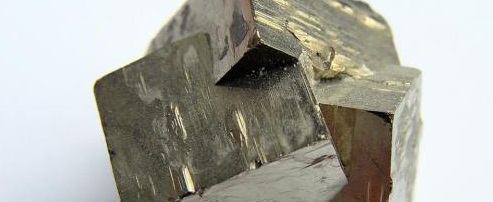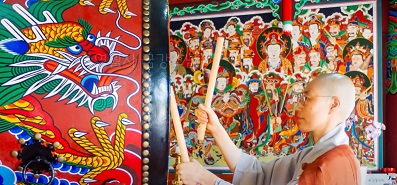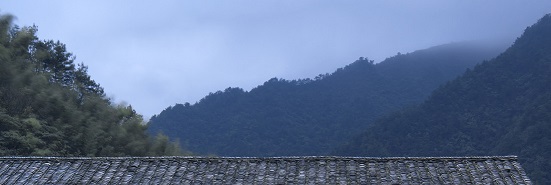天下宗師 一切微塵數 諸大 善知識
천하종사 일체미진수 제대 선지식
chon ha jong sa il che mi jin su je dae seon ji shik
heaven below grand master all small particles count every great good perceive realize (善知識 = kalyāṇa-mitratā: admirable friendship, sacred friendship)
We sincerely pay homage to all the previous generations of great masters who have brought the lamp of the dharma from the west to the east, and to Korea in particular, and to all of our great teachers and spiritual friends, who are as numerous as the atoms of the universe.
Category: zen
Master Uisang’s Haein-do (aka “The Song of Dharma Nature”)
14
Bodhisattvas use this Dhāraṇī like a bottomless treasure chest
To decorate and glorify Dharmadhātu, the palace of the Mind.
15
Sit down in your Original Place and see
That everything is as it is, like Buddha of old.
Korean Buddhist Chanting by Bhikkhuni Gumgang
First she does the Thousand Hands and Eyes Sutra. She starts right off with the mantra to purify speech (suri suri mahasuri ….), that is, she does not include the “invocation” at the beginning. Also, she recites the Great Dharani three times, which is very cool. Other than that it is almost exactly the way that Zen Master Seung Sahn taught this chant (there are a few places where her pronunciation is clearly different).
busy busy pulling grass ….. (忙忙撥草去追尋)
家山漸遠,歧路俄差。得失熾然,是非蜂起。
Gradually our original home fades in the distance and suddenly we are lost among the myriad branching paths. Now we have entered the blazing fire of gain and loss, and also the forest of right and wrong where the leaf of every tree stings like a bee.
About “mindisbuddha.org”: Buddhism, Chanting, Chinese, etc …..
This is my personal blog, but it also links to a Zen meditation group that meets at my house and also online. If you are looking for the Dae Do Sah Zen Group – that web page is here.
This blog consists mostly of stuff that I find here and there, and that I don’t want to forget. The two most common themes for posts are Buddhist Chanting and Chinese – and these very often overlap.
Swim and play in the Dharma King’s Palace (遊戱法王宮)
遊戱法王宮
swim play dharma king palace
遊 yóu, to swim; 戱 xì to play; 法 fǎ Dharma; 王 wáng king; 宮 gōng palace
“Zen is Buddhism and not a special teaching distinct from the other schools of Buddhism”
if you ask me to talk about our teaching, I will talk mostly about the teaching of Buddhism
The Great Dragon Samadhi (那伽大定)
那 伽 nà-gā
大 dà great
定 dìng samadhi
Go out through the gate, and you meet Shakyamuni. Come in through the gate, and you meet Maitreya.
出 = come out, leave
門 = gate
逢 = meet
釋迦 = Shakya, the historical Buddha
No words are needed between these two friends (aka: Riding the Ox Home)
知音何必鼓唇牙
知音 lit: know sound; meaning: one who listens attentively, bosom friend, a friend who understands you
何必 lit: why certainly; meaning: why?
鼓唇牙 lit: drum, lip, teeth; meaning: nonsense sounds
my “translation”: No words are needed between these two friends






